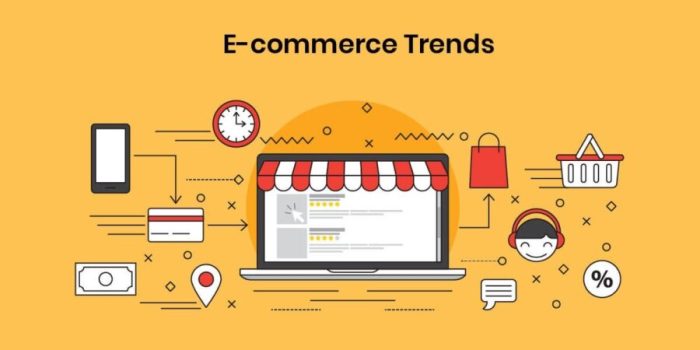
As Mobile e-commerce marketing trends takes center stage, this opening passage beckons readers with entertaining interactive style into a world crafted with good knowledge, ensuring a reading experience that is both absorbing and distinctly original.
Mobile e-commerce marketing is not just a buzzword; it’s a dynamic landscape shaping the future of online shopping. Let’s dive into the latest trends and strategies driving this digital revolution!
Mobile e-commerce marketing trends
In today’s rapidly evolving digital landscape, mobile e-commerce marketing trends are constantly changing to adapt to consumer behavior and technological advancements. The rise of smartphones and mobile apps has revolutionized the way people shop online, leading to new strategies for e-commerce businesses to engage with customers on mobile platforms.
Impact of Mobile Shopping on E-commerce Marketing Strategies
Mobile shopping has significantly impacted e-commerce marketing strategies by shifting the focus towards creating seamless and personalized shopping experiences for mobile users. With the increasing number of people using smartphones to browse and purchase products online, businesses are prioritizing mobile optimization, responsive design, and mobile-friendly payment options to enhance the overall shopping experience.
Role of Mobile Apps in Influencing E-commerce Marketing Trends
Mobile apps have become a crucial element in shaping e-commerce marketing trends by offering a more convenient and engaging shopping experience for customers. E-commerce businesses are leveraging mobile apps to send personalized notifications, provide in-app promotions, and streamline the checkout process, ultimately driving higher conversions and customer loyalty.
Social Media’s Role in Shaping Mobile E-commerce Marketing
Social media plays a vital role in shaping mobile e-commerce marketing trends by providing a platform for businesses to engage with customers, showcase products, and drive traffic to their mobile apps or websites. With the rise of social commerce and influencer marketing, e-commerce businesses are leveraging social media channels to reach a wider audience, build brand awareness, and drive sales through targeted advertising and engaging content.
Marketing e-commerce

In the world of e-commerce, marketing plays a crucial role in the success of businesses. Effective marketing strategies can help attract customers, increase sales, and build brand loyalty in the competitive online marketplace. Let’s explore the importance of marketing in e-commerce, examples of successful strategies, challenges faced, and the impact of personalized marketing on sales.
Importance of Marketing in E-commerce
Marketing is essential for e-commerce businesses to reach their target audience, create brand awareness, and drive sales. Without effective marketing efforts, it can be challenging for online retailers to stand out among competitors and capture the attention of potential customers.
- Utilizing social media platforms for targeted advertising
- Implementing email marketing campaigns to engage with customers
- Optimizing website content for search engines to improve visibility
- Creating compelling product descriptions and visuals to entice customers
Challenges of Marketing in E-commerce
While marketing is crucial for e-commerce success, it also comes with its own set of challenges. From fierce competition to changing consumer behaviors, e-commerce marketers must navigate various obstacles to reach their target audience effectively.
- Adapting to constantly evolving digital marketing trends
- Managing customer expectations and feedback in real-time
- Dealing with data privacy concerns and regulations
- Balancing between online and offline marketing strategies
Personalized Marketing in E-commerce
Personalized marketing involves tailoring promotional efforts to individual customers based on their preferences, behaviors, and purchase history. This approach can significantly enhance e-commerce sales by creating a more personalized and engaging shopping experience for customers.
- Recommendation engines that suggest products based on past purchases
- Personalized email campaigns addressing specific customer needs
- Dynamic website content that changes based on user interactions
- Reward programs that offer personalized discounts and incentives
Wrap-Up

From the impact of mobile apps to the role of social media, Mobile e-commerce marketing trends are constantly evolving. Stay ahead of the game by capitalizing on these trends and watch your online business soar to new heights!
Questions and Answers
How are mobile apps influencing e-commerce marketing trends?
Mobile apps are revolutionizing the way consumers shop online by providing a seamless and personalized shopping experience, leading to increased engagement and sales.
What is the role of social media in shaping mobile e-commerce marketing?
Social media platforms play a crucial role in influencing consumer buying decisions and driving traffic to e-commerce websites, making it an essential component of any mobile marketing strategy.
How can personalized marketing enhance e-commerce sales?
Personalized marketing allows businesses to tailor their marketing messages to individual customers, creating a more personalized shopping experience that leads to higher conversion rates and customer loyalty.





